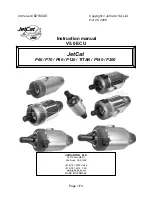
Safety information
5
Hot Surfaces and Fluids
A hot engine always presents the risk of burns. Be on
your guard against hot surfaces: the exhaust mani-
fold, turbocharger, oil pan, charge air pipe, starting
heater, hot coolant and hot lubricating oil in pipes,
hoses etc.
Chemicals
Most chemicals, such as glycol, rust preventer, con-
servation oils, degreasers etc. are hazardous. Always
read and follow the directions on the packages.
Certain chemicals such as preservative oils are flam-
mable and also dangerous when inhaled. Ensure good
ventilation and use a protective mask when spraying.
Always read and follow the directions on the packages.
Keep chemicals and other hazardous materials out of
the reach of children. Hand in surplus or used chemi-
cals to a recycling station for disposal.
Lubrication System
Hot oil can cause burns. Avoid skin contact with hot
oil. Make sure that the oil system is de-pressurized
before starting work. Never start or run the engine with
the oil filler cap removed, because of the risk of oil
ejection.
Cooling System
Avoid opening the coolant filling cap when the engine
is hot. Steam or hot coolant can spray out and cause
burns.
Nevertheless, if the filler cap, coolant hose etc., has
to be opened or removed when the engine is hot, undo
the filler cap slowly and carefully, to release the pres-
sure before removing the filler cap completely and
starting work. Note that the coolant can still be hot
and cause burns.
Fuel System
Always protect your hands when searching for leaks.
Fluids which leak under pressure can force their way
into body tissue and cause severe injury. There is a
risk of blood poisoning (septicemia).
Always cover the alternator if it is located beneath the
fuel filters. Fuel spillage can damage the alternator.
Electrical system
Cut the Current
Before any work is done on the electrical system, the
engine must be stopped and the current cut by switch-
ing off the main switch(es). External current supply for
engine heaters, battery chargers or other auxiliary
equipment connected to the engine must be discon-
nected.
Batteries
Batteries contain a highly corrosive electrolyte. Pro-
tect your eyes, skin and clothes when handling or
charging batteries. Always use protective goggles and
gloves.
If acid comes into contact with your skin, wash with
soap and plenty of water. If you get battery acid in
your eyes, flush at once with lots of cold water, and
seek medical assistance immediately.
Arc Welding
Remove the positive and negative cables from the
batteries. Then disconnect all cables connected to the
alternator.
Always connect the welder earth clamp to the compo-
nent to be welded, and as close as possible to the
weld site. The clamp must never be connected to the
engine or in such a way that current can pass through
a bearing.
When welding is completed:
Always connect the al-
ternator cables
before
the battery cables are re-at-
tached.
Summary of Contents for TAD734GE
Page 2: ......
Page 3: ...TAD734GE EMS 2 OPERATOR S MANUALp ...
Page 66: ...Notes ...
Page 71: ......
Page 72: ...7747302 English 03 2007 ...










































